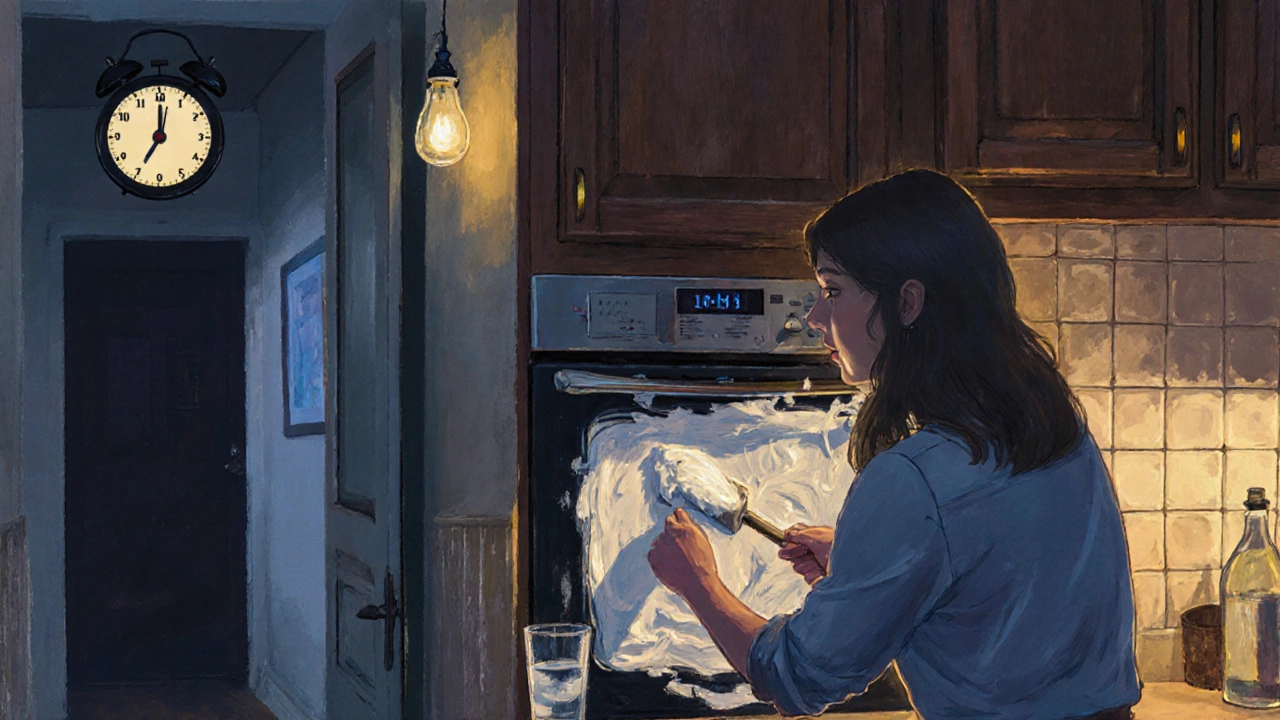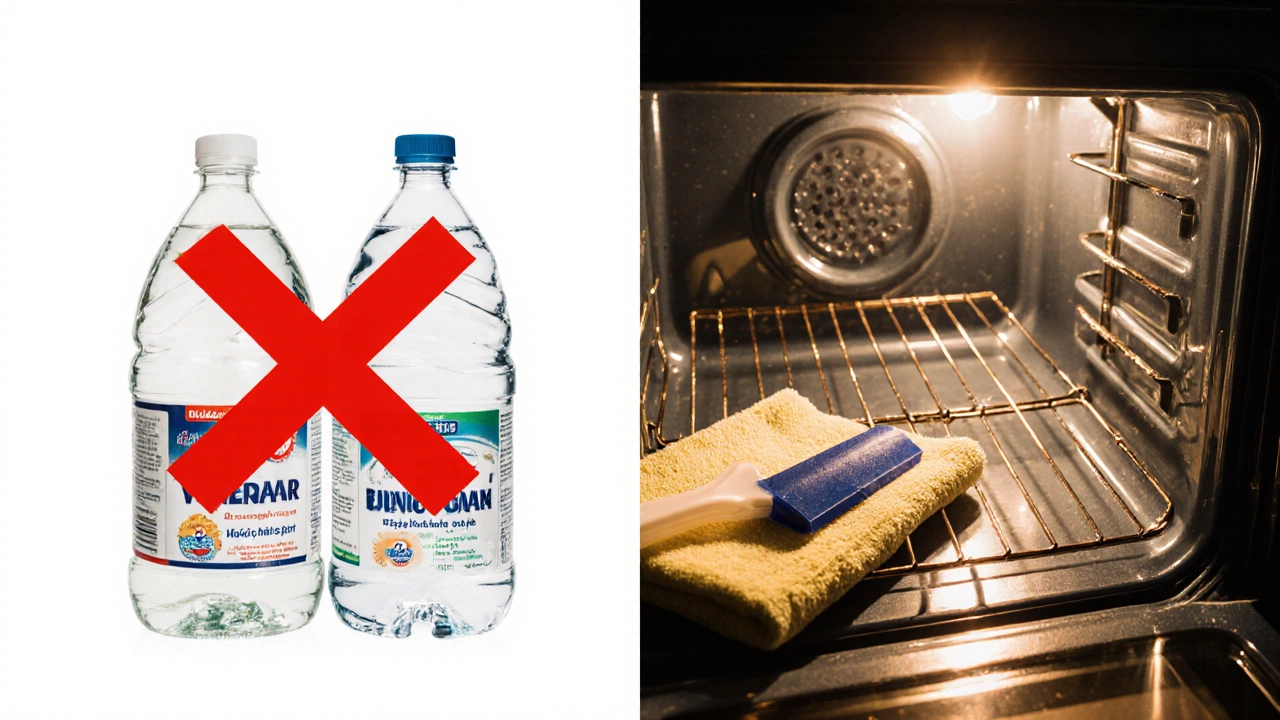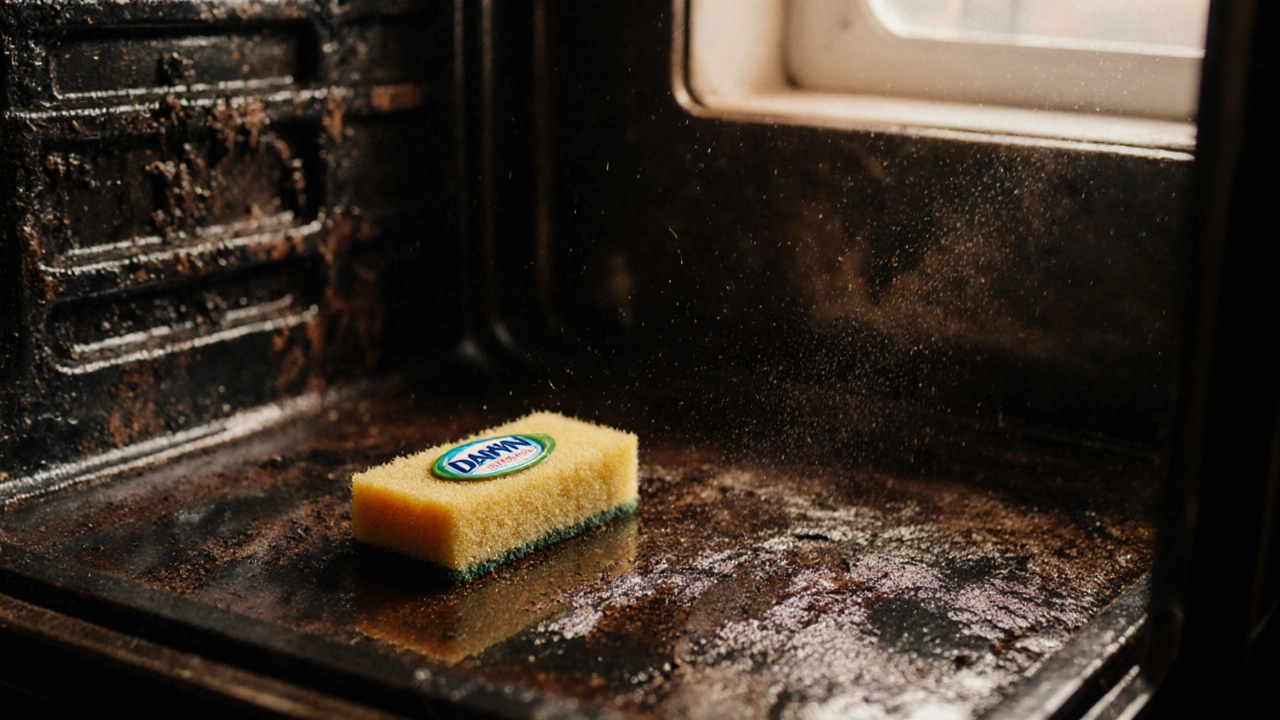Oven Cleaning Method Calculator
This tool helps you determine the best cleaning approach for your oven based on its size and the level of grime. Select your oven's size and grime level to see the recommended method and what you'll need.
Recommended Method
Materials Needed
Estimated Time
You’ve got a greasy, baked-on mess in your oven. The self-clean cycle is too loud, too smelly, and your landlord won’t let you use harsh chemicals. So you ask: Dawn and vinegar-can they really clean your oven? The short answer is yes, but not the way most people think.
Why Dawn and Vinegar Get So Much Hype
People love this combo because it’s cheap, non-toxic, and smells like lemon instead of chemicals. Dawn dish soap cuts grease like a pro. Vinegar dissolves mineral buildup and leaves surfaces shiny. Put them together, and it sounds like magic. But ovens aren’t just greasy-they’re baked-on. Food spills carbonize over time. Grease turns into a tar-like crust. That’s not something a quick spray-and-wipe can fix.How Oven Grime Actually Builds Up
Oven grime isn’t just oil. It’s a mix of fats, sugars, proteins, and carbon. When you roast chicken, bake cookies, or spill syrup, those molecules break down under heat. They stick to the metal, then harden. After a few months, you’ve got a layer that’s part grease, part charred food, part glue. Regular cleaners dissolve grease. But they don’t lift carbonized gunk. That’s why store-bought oven cleaners contain lye or caustic soda-they chemically break down the carbon bonds. Vinegar and Dawn? They don’t do that.What Dawn Actually Does in an Oven
Dawn is a surfactant. That means it breaks the surface tension of grease, letting water lift it away. In a sink? Perfect. In an oven? It helps if you can soften the grime first. Dawn alone won’t touch hardened carbon. But if you warm the oven slightly (not hot enough to burn, just warm to the touch), then spread Dawn on the surfaces, it can start to loosen the top layer of grease. Leave it for an hour. Wipe. You’ll see improvement on recent spills. Not on the black, crusty stuff from last Christmas.What Vinegar Actually Does in an Oven
Vinegar is acetic acid. It’s great for dissolving limescale, soap scum, and rust. But oven grime isn’t mineral-based. It’s organic carbon. Vinegar can’t break carbon chains. Spraying vinegar on a dirty oven? It’ll evaporate before it does anything. The smell might make you feel like you’re cleaning, but it’s mostly psychological. Some people mix vinegar with baking soda, hoping for a fizzy reaction. That fizz? It’s just carbon dioxide gas. It doesn’t scrub. It doesn’t lift. It just makes noise.
When Dawn and Vinegar Actually Work Together
There’s one scenario where this combo helps: light cleaning between deep cleans. If you wipe up spills right after cooking, Dawn and a splash of vinegar can stop grime from hardening. Use a sponge, spray a little Dawn, add a teaspoon of vinegar, wipe. Do this weekly, and your oven stays manageable. But if you haven’t cleaned in six months? This won’t cut it.What You Should Do Instead
If your oven is truly dirty, here’s what works-without buying industrial cleaners:- Remove oven racks. Soak them in hot water, 1 cup of baking soda, and a few drops of Dawn for 4 hours. Scrub with a nylon brush.
- Make a thick paste: ½ cup baking soda + 3 tablespoons water. Spread it on the oven walls, floor, and door-avoid heating elements. Don’t get it on the seals.
- Let it sit overnight. Baking soda is mildly abrasive and alkaline. It slowly breaks down grease and carbon.
- Wipe off the paste with a damp cloth. Use vinegar on a second cloth to neutralize any residue and cut lingering odors.
- For stubborn spots, use a plastic scraper (never metal). Gently lift the grime.
This method is what professional cleaners use. It’s slow. It’s quiet. It doesn’t smell like a chemical factory. And it actually works.
Why People Think Dawn and Vinegar Work
There’s a reason this myth sticks. People try it on light messes. They wipe the oven, it looks better, and they think the combo did the job. But they didn’t clean the oven-they cleaned the surface layer. The real grime stayed hidden underneath. A week later, the same spots return, darker than before. That’s when they blame the method, not the timing.
What Doesn’t Work (And Why)
- Boiling vinegar in the oven-it just fills the room with fumes. No cleaning power.
- Adding lemon juice-it’s acidic like vinegar, same problem.
- Using vinegar spray right after Dawn-they neutralize each other. The acid and base cancel out. You’re left with salt water.
- Putting the oven on high heat after applying the mix-you’re baking the soap into the surface. Now you’ve got a harder mess to clean.
Real-World Example: My Oven in Bristol
I live in a 1930s terraced house. My oven hasn’t been professionally cleaned since I moved in. Last year, I tried the Dawn-and-vinegar spray. After 30 minutes, I wiped it off. It looked cleaner-until I turned the oven on. The smell of burnt soap filled the kitchen. The black spots were still there. So I tried the baking soda paste. I left it overnight. The next day, I wiped it with a damp cloth. Then I used vinegar to rinse. The oven looked like new. No fumes. No scrubbing. No damage to the enamel. I’ve done it twice since. It takes time, but it’s the only method that’s consistent.When to Call a Pro
If your oven has heavy carbon buildup, warped racks, or damaged seals, DIY won’t cut it. Professionals use steam cleaners and industrial-grade degreasers. They can remove 20-year-old grime without scratching the interior. If you’re selling your home or renting out, a deep clean adds value. Don’t risk damaging the oven trying to save a few pounds.Prevention Is the Best Cleaner
The easiest way to keep your oven clean? Stop the mess before it starts.- Line the bottom with foil or a silicone mat. Replace it every few uses.
- Wipe spills with a damp cloth while the oven is still warm (but not hot).
- Run the self-clean cycle once a year if your oven has one. It’s not perfect, but it’s better than nothing.
- Use oven-safe lids when baking. Splatters drop less.
Clean ovens don’t need magic potions. They need consistency.
Can I use Dawn and vinegar to clean my oven?
You can, but only for light, fresh grease. Dawn and vinegar won’t remove baked-on carbon or heavy grime. For real cleaning, use baking soda paste left overnight. It’s safer, more effective, and doesn’t leave a soapy smell.
Is vinegar bad for oven interiors?
No, vinegar isn’t harmful to oven interiors. It won’t damage enamel, glass, or stainless steel. But it also won’t clean heavy grime. The acid in vinegar is too weak to break down carbonized food. It’s fine to use for rinsing after baking soda, but don’t rely on it alone.
Does Dawn dish soap damage oven racks?
No, Dawn won’t damage oven racks. In fact, it’s one of the best ways to clean them. Soak racks in hot water with Dawn and baking soda for a few hours, then scrub with a nylon brush. Avoid steel wool-it scratches the metal.
How often should I clean my oven?
Clean it every 3-6 months if you use it regularly. If you cook daily, wipe spills weekly to prevent buildup. A quick wipe after each use saves hours of scrubbing later. Waiting until it’s black is the worst thing you can do.
Can I use baking soda and vinegar together for oven cleaning?
Yes-but not at the same time. Use baking soda paste first, leave it overnight, then wipe it off. Afterward, spray vinegar to neutralize any residue and remove odors. Mixing them together creates a fizzy reaction that doesn’t help cleaning. It’s a waste of ingredients.
Is it safe to clean an oven with children or pets around?
Yes, if you use baking soda and vinegar. They’re non-toxic and don’t release fumes. Avoid commercial oven cleaners-they contain lye and can cause respiratory irritation. Baking soda paste is the safest option for homes with kids or pets.
Why does my oven still smell after cleaning?
Leftover grease or carbon can smoke when heated. After cleaning, run the oven on 200°C for 20 minutes with the door open. This burns off any remaining residue. If it still smells, you didn’t remove all the grime. Try the baking soda method again, focusing on the bottom and corners.
Can I use this method on a self-cleaning oven?
Yes, but avoid using baking soda paste if your oven has a catalytic lining. Check your manual. For most modern self-cleaning ovens, baking soda is safe. Just don’t use it right before running the self-clean cycle. Wait at least 24 hours.
